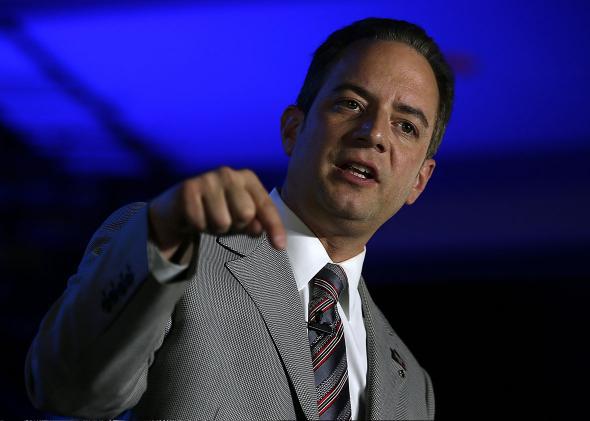There were real problems with the Republican presidential debate in Boulder, Colorado, hosted by CNBC. Yes, the moderators typically asked sharp, policy-focused questions. They pushed outsider candidates like Ben Carson and Donald Trump to explain ambitious plans to cut taxes and remove unauthorized immigrants, and they questioned plans from more establishment candidates like Sen. Marco Rubio and Gov. Chris Christie. At the same time, the moderators couldn’t manage the candidates, who monologued, ignored requests, and largely drove the speed and direction of the debate.
Which is to say that Republicans were in control of the night. Still, they were angry. Sen. Ted Cruz won huge applause with a tirade against the moderators. “This is not a cage match,” he decried. “And, you look at the questions: ‘Donald Trump, are you a comic-book villain?’ ‘Ben Carson, can you do math?’ ” Rubio did the same. “It was the week [Hillary Clinton] got exposed as a liar. … But she has her super PAC helping her out, the American mainstream media.” After the debate, Republican National Committee Chairman Reince Priebus voiced his frustration with this alleged media bias. “CNBC should be ashamed of how this debate was handled,” he said on Twitter.
On Friday, acting on this anger, the RNC announced it would end its partnership with NBC (and Univision) and withdraw from an upcoming debate in February. “While debates are meant to include tough questions and contrast candidates’ visions and policies for the future of America, CNBC’s moderators engaged in a series of ‘gotcha’ questions, petty and mean-spirited in tone, and designed to embarrass our candidates,” Priebus said in a letter to NBC News.
NBC has issued a response. “This is a disappointing development. However, along with our debate broadcast partners at Telemundo we will work in good faith to resolve this matter with the Republican Party,” it said.
But it’s honestly hard to see how this is possible. Priebus notwithstanding, CNBC asked tough, fair-minded questions. It’s just that the candidates didn’t like them. Carl Quintanilla asked Ben Carson about his involvement with a company called Mannatech, which makes nutritional supplements. Carson has appeared in the company’s videos and ostensibly endorsed its products, which it claims can cure autism and cancer. It’s a real problem for his campaign and his image as a clean, honest figure. Yet Carson called the question “propaganda.”
Later, Quintanilla asked Rubio about his finances, from “a lack of bookkeeping skills” to concerns over his use of campaign and Florida Republican Party cash. Rubio’s response? “You just listed a litany of discredited attacks from Democrats and my political opponents, and I’m not gonna waste 60 seconds detailing them all.” But this is nonsense. These are serious questions about Rubio’s past, and they deserve an answer. The problem, put simply, is that the Florida senator doesn’t want to hear them.
You saw this again when John Harwood asked Rubio about his tax plan and its benefits for middle-class families. “The Tax Foundation, which was alluded to earlier, scored your tax plan and concluded that you give nearly twice as much of a gain in after-tax income to the top 1 percent as to people in the middle of the income scale,” he said. “Since you’re the champion of Americans living paycheck-to- paycheck, don’t you have that backward?” This is true, and less favorable analyses find huge benefits for the rich and comparatively small ones for everyone else. Rubio, however, didn’t answer the question. Instead, he made a different point entirely—“In fact, the largest after-tax gains is for the people at the lower end of the tax spectrum under my plan.” And conservatives—taking Rubio’s side—accused Harwood of lying.
You can play this game for the entire debate. When Cruz went on his anti-media rant, it was following a substantive question about his rhetoric and approach: “Congressional Republicans, Democrats, and the White House are about to strike a compromise that would raise the debt limit, prevent a government shutdown, and calm financial markets that fear of—another Washington-created crisis is on the way. Does your opposition to it show that you’re not the kind of problem-solver American voters want?” Again, this wasn’t unfair. Cruz just didn’t want to answer it. The entire night, Republicans trafficked in half-truths and falsehoods, from Christie’s misleading claim that Social Security was bankrupt (which came directly after he promised to “be honest with the people watching at home”) to Carly Fiorina’s invented “fact” that “92 percent of the jobs lost during Barack Obama’s first term belonged to women.”
Which brings us back to Priebus’ letter. The problem isn’t that CNBC engaged in “gotcha” questions meant to “embarrass” the Republican candidates. It’s that any serious look is a fatal blow to GOP plans and proposals, which don’t deliver on promised substance. Trump can’t deport millions of immigrants; Carson can’t raise enough revenue to fund the federal government; and the “middle-class” tax plans of Bush, Rubio, and others shower most of their benefits on the rich. And as long as this is true, GOP candidates will have a hard time with all but the most friendly moderators.
Read more of Slate’s coverage of the 2016 campaign.
